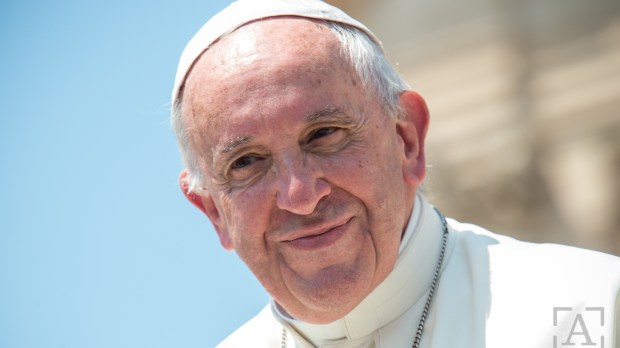Pope Francis sat down for 20 conversations with French journalist Dominique Wolton for a book-length interview that will be released in French on Wednesday. The 432-page volume is titledPolitique et société : un dialogue inédit, or Politics and Society. Conversations with Dominique Wolton.
Wolton conducted the interview sessions over the span of two years, in the first time that the pope has given such a lengthy amount of time to a project like this.
Wolton is a sociologist and the director of France’s National Institute of Communication Science (l’Institut des sciences de la communication), known for a book-length interview with the former archbishop of Paris, Jean-Marie Lustiger.
The French periodical Le Figaro has published some excerpts of the book; Aleteia offers you a provisional translation of some of these.
Jesus himself was a refugee, a migrant
—You said, in Lesbos in January or 2016, something beautiful and unique: “We are all migrants; we are all refugees.” In these times when European and Western powers are closing off, what else can be said about this magnificent phrase? What can be done?
There is a phrase that I’ve said, and some migrant youth had it written on a t-shirt: “I am not a danger. I am in danger.” Our theology is a theology of migrants. All of us are migrants since the call that Abraham received, and then on through all the migrations of the People of Israel, up to Jesus himself, who himself was a refugee, a migrant.
Besides that, at an existential level, in faith, we are migrants. Human dignity necessarily implies “to be on the way.” When a man or a woman is not progressing, he or she becomes a mummy. A museum piece. The person ceases to be a living thing.
— […] And after you said that in Lesbos, the situation has gotten worse. Many expressed admiration for your words, but nothing changed. What would you say today?
The problem begins in the country where the migrants are coming from. Why do they leave their lands? Because of a lack of work, or because of war. Those are the two main reasons. The lack of work — they are exploited.
I think of the Africans. Europe has exploited Africa … I don’t know if that can be said, but some of the colonizations … yes, they have exploited it.
I read that a leader of an African state who was recently elected, with his first act of government, proposed to Parliament legislation to reforest the country. In fact, the legislation has already gone into effect. The economic powers of the world had cut down all the trees. To reforest. The ground has dried up because of having been exploited excessively. And now there is no work.
The first thing that we should do, and I said it before the United Nations and before the Council of Europe, in every locality, is find resources there to create employment, and invest. It’s true that Europe has to invest in itself too. Because here too there is a problem of unemployment.
The other cause of migrations is war. We could invest, the people could have sources of work, and not need to leave, but if a war starts, then they have to flee anyway. Who makes war? Who gives them weapons? We do.
Europe right now is afraid. It is closed, closed, closed …
I think that Europe has become a “grandma,” but I would like to see a Europe that is a mother. Referring to birth rates, France is at the head of developed nations, with a rate of more than 2%, I believe. But Italy is around 0.5%, it is much weaker. The same in Spain. Europe can lose the notion of its culture, of its tradition. Let us think that it has been the only continent that has given us such a great cultural richness, and I want to emphasize that. Europe must find itself again, returning to its roots. And not be afraid. It should not be afraid to become a Europe that is a mother …
— What is your main worry or concern about Europe?
I don’t see anyone like Schumann, like Adenauer …
— [Wolton chuckles] … But you are here. There are others …
At this moment, Europe is afraid. It is closed, closed, closed […]
Europe is a case of cultural integration, multicultural, very strong. Always has been. The Lombards, our Lombards of today are barbarians who arrived a long time ago … and then everyone mixed together and we have our culture.
What does European culture consist of? How could the European culture of today be defined? Yes, it is true, it has important Christian roots. But that isn’t sufficient to define it. All of our capacities are found there. This capacity to integrate, to receive others. The language is also in the culture. In our Spanish language, 40% of the words are Arabic. Why? Because they were there seven centuries. They have left their footprint […]
The Argentinean identity is mestizo. I’ve always felt I’m something of this
— In what way do you feel Argentinean? From your perspective, what is the Argentinean identity?
In Argentina, there are native peoples. We have indigenous peoples. The Argentinean identity is mestizo. The waves of immigrants have mixed, mixed, mixed … I think that it is the same thing that happened in the United States, where the waves of immigrants have mixed the peoples. The two countries resemble each other quite a lot. And I have always felt I’m something of this. For us, it was something very normal to have various religions together at school. […] Some countries have been able to integrate immigrants in their life. But others have “objectified” them over two or three generations of ghettos. Without integration.

